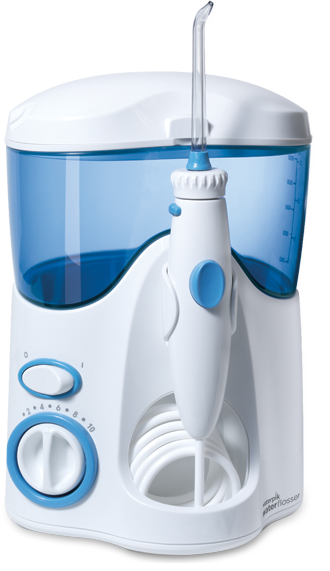October 17th, 2013
This is National Dental Hygiene Month! While proper oral hygiene is always important, this month we focus on covering four important components: Brush, Floss, Rinse, and Chew!

Brush: Brushing your teeth for at least 2 minutes 2 times a day should be part of your daily routine. Make sure that you are using the proper technique so that your brushing is effective and you don't cause any damage.
Floss: Flossing everyday helps remove plaque and food particles located along the gumline and in between your teeth that your toothbrush cannot reach. If you floss before you brush, the flouride from your toothpaste is able to access between your teeth better.
Rinse: Using a mouthrinse is a great addition to your daily brushing and flossing routine. Rinsing with an anti-microbial mouthwash helps to cleanse the areas of your mouth not reached by your toothbrush and floss.
Chew: If you aren't able to brush after eating, then chew a piece of sugar-free gum. Gum that contains xylitol not only helps to clean food and plaque particles from your teeth, but it also has anti-cavity properties. Chewing gum gets your salivary glands flowing which helps to neutralize plaque acids and wash away food particles.
So remember, Brush, Floss, Rinse, Chew!
October 16th, 2013
Regular flossing is important to your dental health and a proven way to prevent gingivitis. However, adding a dental irrigator to your daily routine is a great way to prevent plaque build up and cavities. Irrigators use a stream of pulsating water which helps to wash away food particles and to remove plaque that accumulates along your gumline and between your teeth.
While everyone can benefit from using a dental irrigator, we highly recommend them to
- anyone who has braces. Teenagers especially find an irrigator easier to use than floss threaders, which can be a tedious way to clean around brackets and bands.
- dental implant patients. An irrigator is a very productive way to clean around implants and gum tissue without damaging them.
- patients who struggle with traditional flossing. This can include younger patients who lack the coordination required to use regular floss, as well as older patients who find that changes in their mouth (decreased salivary flow, gum recession, etc.) result in accumulation of more plaque.
A dental irrigator is a convenient and easy tool to use to optimize your oral health. Here at Jacques Dentistry, we recommend the WaterPik brand dental irrigator. We've found that the counter-top units with a water reservoir are the most effective and easiest to use for our patients -- but we advise you that practice makes perfect! It's best to stand over a sink to catch the excess water and slowly move the tip of the irrigator along your gumline, moving from top back right molar across the front of your mouth and back around. Next time you're in our Greenville, SC, dentist office, ask us for a brochure about the WaterPik -- your mouth will thank you!

October 3rd, 2013
We know you wish your dentist had a magic cure, but sadly there is none for canker sores. However, by avoiding foods that irritate your mouth, such as spicy foods, acidic foods like pickles and sauerkraut, and citrus fruits, you may be able to cut down on how often they occur. When you are suffering from canker sores, eating bland foods until your sores heal can help ease your soreness.
Soft foods that may reduce your discomfort include:
-
dairy foods such as low-fat milk
-
hot cereals like oatmeal
-
pudding and custard
-
scrambled or fried eggs
-
soup
-
tofu
-
cooked, canned and frozen vegetables
-
cooked or canned fruit, such as applesauce
-
soft cooked and shredded chicken, beef and pork
-
creamy peanut butter
-
mashed potatoes

By preparing foods like mashed potatoes or hot cereal with regular or powdered milk, you can boost the nutritional value. It’s important that you are still eating healthily, so choose foods that won’t irritate your mouth but still supply your daily nutritional needs.
Jacques Dentistry -- Greenville, SC
October 2nd, 2013
Did you know that teeth cleanings and dental x-rays are safe for pregnant women? The American College of Obstetricians and Gynecologists approve dental treatment for pregnant patients and encourage patients to see a dentist during pregnancy.

The College committee says, “Oral health is an important component of general health and should be maintained during pregnancy and through a woman’s lifetime.... Maintaining good oral health may have a positive effect on cardiovascular disease, diabetes and other disorders.”
The ACOG committee recommends that OB-GYNs
- Advise patients that oral health care improves general health throughout life and may lessen the transmission of cavity-causing bacteria from mother to infant.
- Assure patients that it is safe to have dental treatment during pregnancy. The prevention, diagnosis, and treatment of oral conditions includes regular cleanings and exams, dental x-rays (with abdominal and thyroid shielding), and the use of local anesthetics.
- Educate women that conditions that require immediate attention -- extractions, root canals, restoring cavities -- may be managed at any time during pregnancy and that postponing treatment may lead to more serious problems.
- Inform pregnant patients that using antacids or rinsing with a baking soda solution (1 teaspoon of baking soda dissolved in 1 cup of water) can help neutralize the acid associated with vomiting due to morning sickness, hyperemesis gravidarum, or gastric reflux during late pregnancy.
Here at Jacques Dentistry, we recommend that all of our patients who are expectant mothers continue with their normal dental care routine, and we encourage those pregnant women who haven’t been seeking regular dental treatment to take the opportunity to improve their oral health now. Pregnant women can rest assured that they will receive optimal care from their dentist right here in Greenville, SC -- we want both mother and baby to be at their healthiest!






